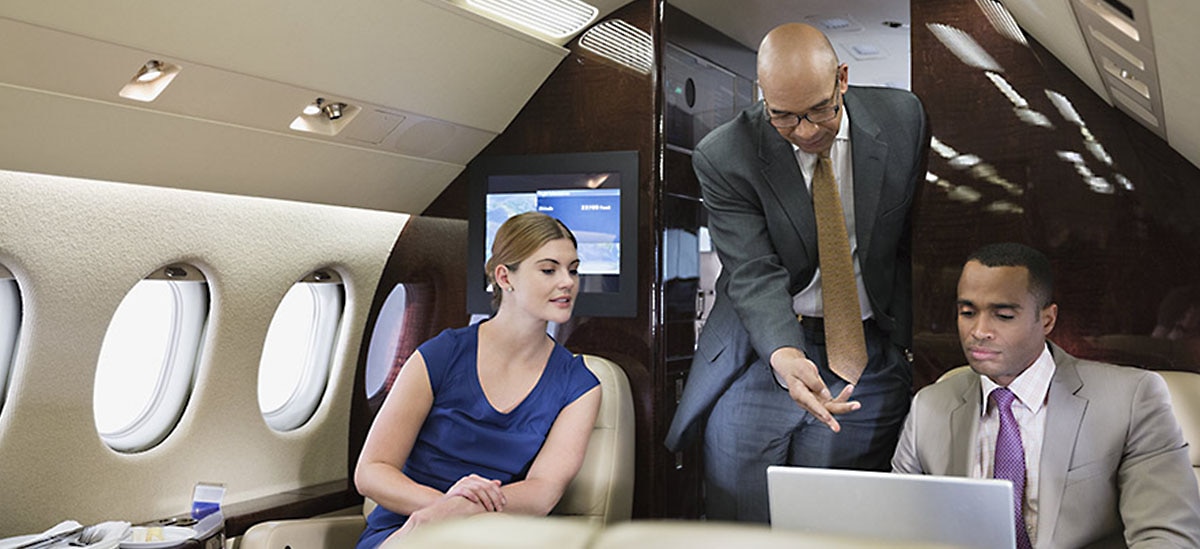
Private aircraft ownership can often invoke images of celebrities jet-setting to exotic locations around the world. In reality, purchasing a private aircraft can save money and offer enhanced opportunities for corporations and businesses owned by high-net-worth individuals.
High-net-worth individuals and corporate executives want to save time and travel quickly to conduct business.
Private and business aircraft ownership can have a positive impact by allowing executives to set their own schedules and grow their business without being at the mercy of commercial airlines. This advantage can save money and could potentially offset the cost of the private aircraft in terms of cost savings, the ability to generate additional business and enhanced travel opportunities.
Rather than viewing the ownership of a private aircraft simply as an expense, in the right situation, it might actually provide a competitive advantage.
Access to Underserved or Remote Locations
The ability to access locations that are “off the beaten track" and not adequately served by regular commercial airline service can be a key advantage of using private aircraft. If your company does business in these types of locations, using a private aircraft can save time wasted in airports, changing flights and renting a car to drive to your ultimate destination.[1]
If restricted to commercial schedules, it may be difficult to justify visiting prospects, clients or company locations in these areas on a frequent basis. This can negatively impact your business and affect potential growth opportunities.
Privacy and productivity
On a private aircraft, business can continue without the presence of strangers sitting in the next seat. This appeals to high-net-worth individuals who have privacy and security concerns that can't be guaranteed on commercial flights and at bustling airports.
In some business situations, executives want to ensure their privacy if they are traveling to a sensitive business meeting involving a confidential transaction, such as a potential acquisition or opportunity with a potential new customer.[2]
A private aircraft offers an environment conducive for working, conducting meetings with other employees or business associates who are also on the flight or transacting business via phone during flight. This additional productivity can be invaluable as preparation can enhance the chances for success in any business situation.
For business executives, the cost of the flight and related expenses to maintain the aircraft can be more than offset by the convenience of being able to fly to a meeting on your own schedule. Sometimes, just showing up can be what it takes to land a new customer.
Tax Advantages and Issues
Purchasing a private aircraft can offer tax advantages, but this acquisition can be more complex than buying a piece of capital equipment or real estate.
A key issue is the ability to justify that a private aircraft is an ordinary and necessary business expense and not just a luxury or convenience purchase.[3]
If an argument can be made that business is normally conducted in locations that have limited or no commercial service, a private aircraft is easier to justify. It can also apply if travel often occurs at the spur of the moment or at irregular times.
Using a private aircraft to address legitimate privacy and security concerns for executives and employees can be another justification.
There can be a number of taxes, such as potential sales and use taxes, associated with private aircraft ownership, one being how the aircraft is owned. Ownership by a separate entity other than the main operating business can lead to tax implications.
Before purchasing a private aircraft, it is wise to have your tax and legal advisers conduct a thorough review in terms of the best ownership structure and the anticipated usage to ensure the best possible tax outcome.[3]
Additionally, there are distinct rules regarding the separation of business and personal use of the aircraft. This can extend to personal use as a perk for employees and even in the case of a spouse flying on an executive plane without a business purpose.
It's important to establish rules for usage and to account for travel using a consistent process that meets both internal and external reporting requirements.
The diligent maintenance of usage records and the reason for each passenger being on each flight is critically important.[4]
If properly structured and used, the cost of private aircraft ownership can be partially offset by tax benefits that can reduce the cost of ownership.
We Can Help
PNC Aviation Finance offers knowledgeable financing solutions to make private aircraft ownership possible and affordable.
We offer custom-tailored financing packages based on business needs and circumstances. Our experienced aviation finance team understands and has extensive knowledge regarding private aircraft ownership requirements, FAA, insurance, operating leases, etc.
We can help you look at the implications of each option and help you decide on the best option for you or your business.
Learn how PNC Aviation Finance can help you fly higher by visiting pnc.com/aviation.




